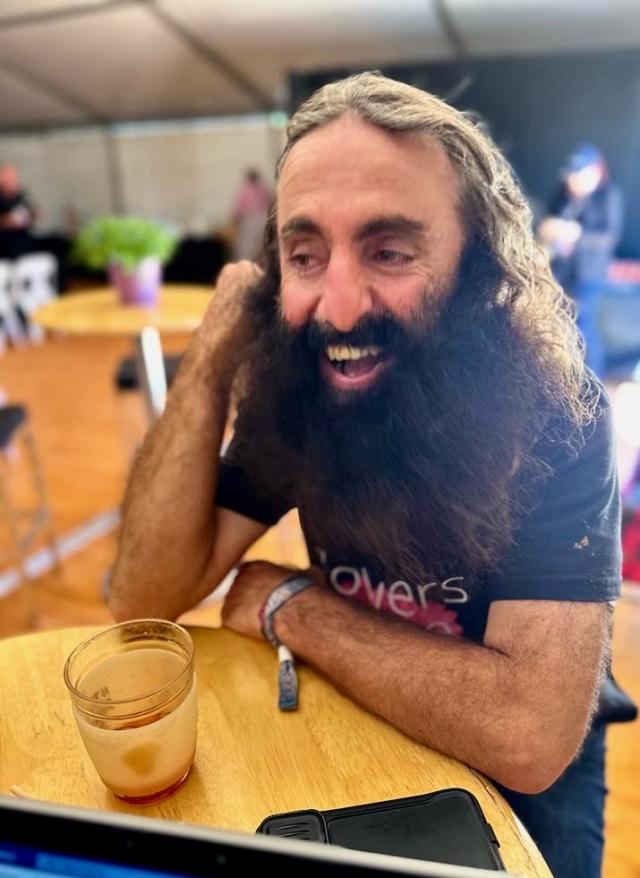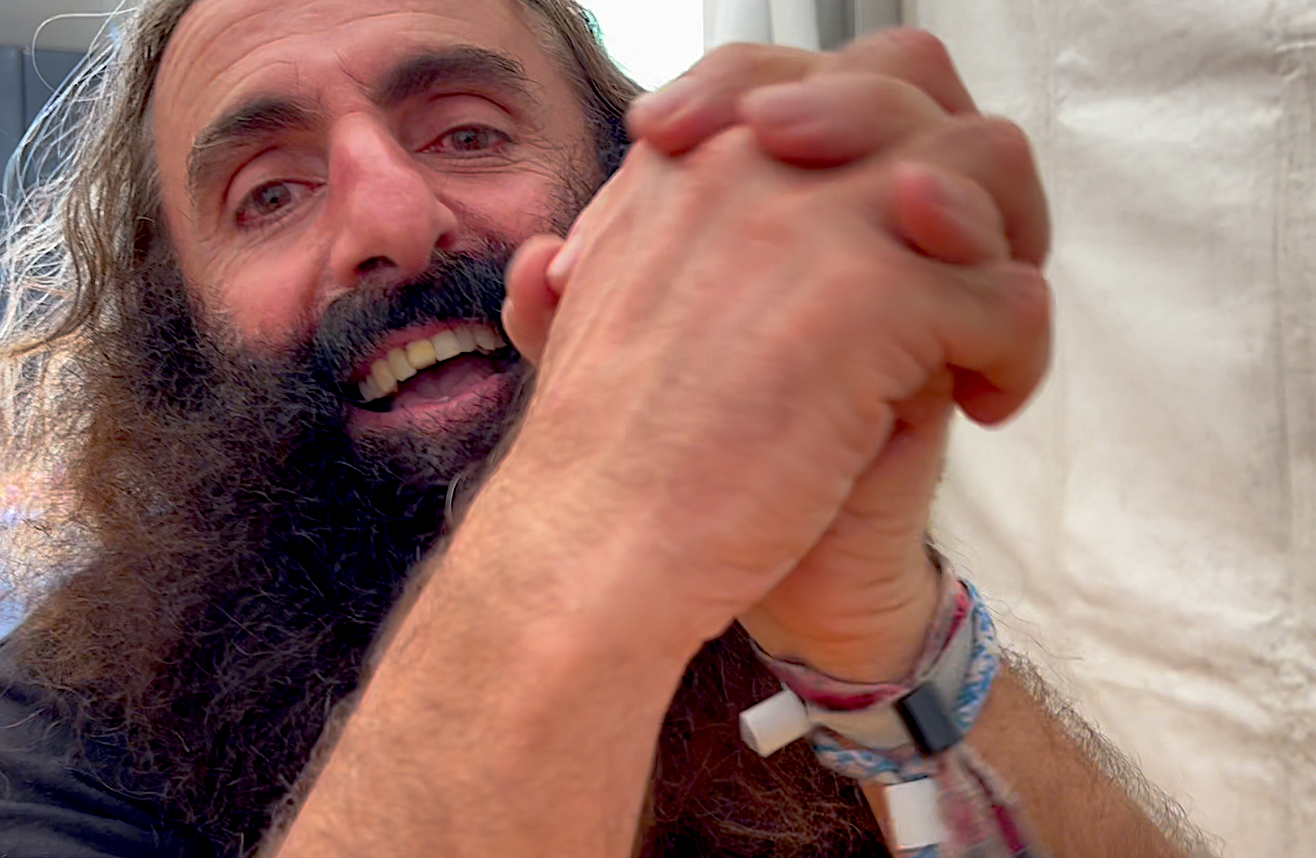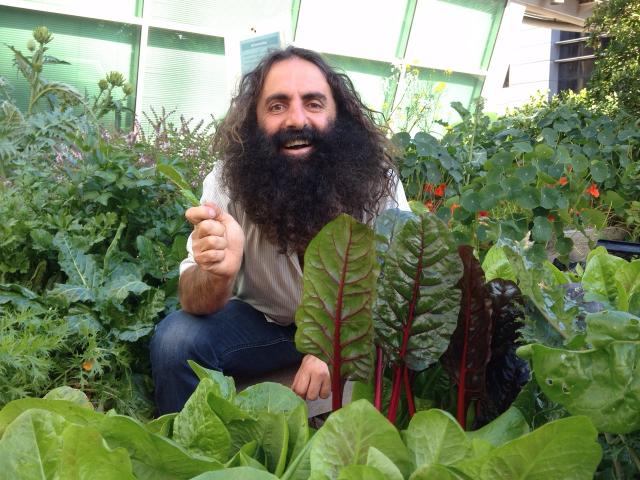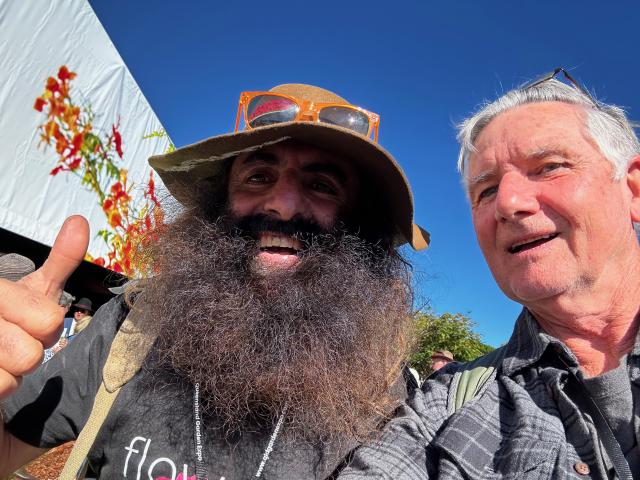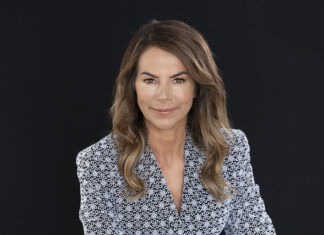He’s the disciple of gardening and an advocate of caring for the environment. ERLE LEVEY catches up with the one and only Costa Georgiadis.
So many of us participated in horticultural therapy during the Covid pandemic – without really realising.
The inimitable Costa Georgiadis was a guest speaker at the recent Queensland Garden Expo and freely gave up his time to share some thoughts on the value of gardening – not just the fresh vegetables and flowers, but the sensory and physical benefits as well.
There has been a flow-on effect from the interest and the uptake of gardening from Covid, the presenter of ABC-TV’s Gardening Australia said. “They didn’t see it as a distraction – they saw it because of the value in it. They read between the lines, whether growing vegetables or going for indoor plants. People were immersing themselves in horticultural therapy without realising it – it’s a trojan horse!”
Sitting with Costa in the Nambour Showgrounds stables, converted as a place for guest speakers to take a break from their busy schedules, created a chance to have a broad-ranging conversation, not just about gardening but nature and the environment. You cannot help but be inspired by his infectious smile and enthusiasm, his knowledge, his authenticity and genuine concern for the health of society. He loves the sense of community that gardening brings, as well as the farmer-style markets that bring fresh produce to consumers.
That led us to talking about the values of sustainability versus the value placed on economic growth and convenience – and how the latter can often have a devastating effect on our environment for generations to come. “We need to go to nature, regroup, then go back to the merry-go-round. We have a chance to see the beauty in nature … the beauty of just witnessing a dragonfly doing its dance, and stopping on a flower. The thing with gardening, connecting with nature, is people who come to events such as the Garden Expo already have that portal, that connection.
A passionate advocate of local markets and produce, Costa points to the sense of community that is very much part of the Mediterranean way of life. By using local produce – whether at markets or retail outlets – the supply chain becomes very close and sustainable.
Says Costa: “From a resilience point of view, you know where your food’s coming from. You know what’s in season, you know what’s available. Otherwise we are sold an idea .. a marketing thing. People become more distant from the supply chain, and the more distant they are, the more vulnerable they become. As soon as that supply chain falters, people go into chaos.’’
Australian consumers are still seeing a shortage of eggs and poultry items, especially on supermarket shelves which will be exacerbated with the push towards better animal welfare standards.
“What do you do when told we can have fresh fruits out of season?’’ Costa asked. “Convenience is the key word. Convenience as opposed to community. One of the best things people can do on a regular basis is if something is convenient, stop and ask why. It’s convenient to be served a drink in a plastic or disposable cup. It’s convenient because you don’t want to wash some cups. But you are paying it on to the next generation with immense landfill.’’
When the conversation moved into the realm of technology, Costa reminded us that in a world being lured by screen-time, gaming and on-line gambling, there are real benefits in gardening. His invitation is to “put your nature goggles on” and understand both the physical and therapeutic benefits of gardens and the power of plants.
He said communities could achieve a lot when they worked together, such as a group of National Disability Insurance Scheme (NDIS) clients who had established a vegie empire by growing seedlings which were now being distributed to market gardens. Then there were landcare gardeners who had returned grazing land back to native bushland. “There’s so many ways that we can see the power of plants as a collaboration with community … with the community you live in at home and the community within the garden, and how you bring biodiversity in and how you create that space. It’s balance. Gardening balances it big time.”
Nature becomes your friend and family, Costa said. “That way, you won’t damage it, you won’t let things happen like ‘cut that down, put in another car park.’ We all have a responsibility to think of generations to come, and there are some really good opportunities to take responsibility.”
This was on show at the Garden Expo with throw-away coffee cups being used to pot free seedlings and in doing so repurposing them. It was what we saw recently on an exchange visit to a German university. The canteen on the campus provided sturdy plastic cups for drinks that were then returned for washing and re-use. There was even a bonus in the way of a refund to the user. It makes you think about the number of coffee cups we throw away each day and how we can ease the landfill issue.
Another initiative staring us in the face, Costa said, was listening to First Nations place names in Australia and their origins. “When you think about NAIDOC week, there is a real opportunity for us to continue listening – listening to First Nation people talk about place names. They’re so important. In Gardening Australia we started to use native place names. The more it happens, the more we can recognise, uncover, talk about, and profile the true history of the country. One of the biggest actions we can do is both plant the native plants – but also learn the First Nations story behind those plants.
“We are starting to understand and celebrate what we have here – to put light on those incredible details. Such as when that tree flowers, it’s a signal that something is happening in the ocean … a signal that something is starting to breed and hatch. That didn’t just happen over 50 years of observation, of 100 years or 200 years. That happened over thousands of years.
“First Nations science is the longest standing testing. It’s in dance, song, writing and painting … when we start to allow that light to shine, then everyone benefits.’’
Modern Australian society can learn much from the past – such as what can withstand and what’s resilient to heat.
You see it everywhere, especially when you get to the more remote, the more arid parts of the country.
“The local plant species have evolved over hundreds of years. They are resilient and capable of not just surviving, they’re thriving. The Western Australia landscape has some of the most depleted soils in the world, yet is home to the most stunning and biodiverse plant and wildlife you could imagine. Plants have adapted, survived and then provided a habitat for new habitat – providing another layer of resilience built with the insects and animals.’’
As well as this resilience, Australia’s natural environment is a matter of values, Costa said. “Values are to take only what we need. In the regions of Italy it is a celebration of ingredients and simplicity. We cannot look at things in a mirrored per-spective. It’s no use killing the environment by a thousand cuts … a little bit here, a little bit there and thinking no-one notices. Attitudes are changing. The next generation is looking at the environment through different lenses.
“That’s the power of the collaborations that I see, and the power of plants.”

